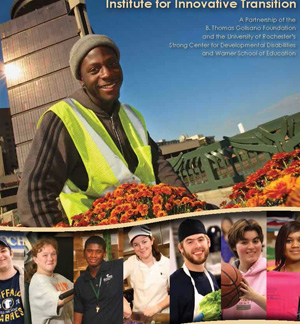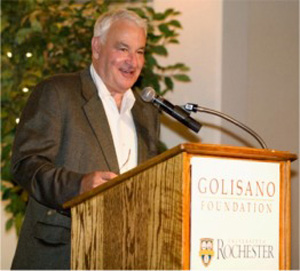
 The Institute for Innovative Transition, now known as the Center on Disability and Education, was launched in 2008 through a partnership of the Golisano Foundation, the University of Rochester's Strong Center for Developmental Disabilities and the Warner School of Education. The Golisano Foundation provided over $2 million to launch and develop the Institute to provide high quality information to people navigating the world of disability. The Center provides expertise, guidance, and linkage to community members, students, families, school districts, non-profit agencies, and higher education institutions.
The Institute for Innovative Transition, now known as the Center on Disability and Education, was launched in 2008 through a partnership of the Golisano Foundation, the University of Rochester's Strong Center for Developmental Disabilities and the Warner School of Education. The Golisano Foundation provided over $2 million to launch and develop the Institute to provide high quality information to people navigating the world of disability. The Center provides expertise, guidance, and linkage to community members, students, families, school districts, non-profit agencies, and higher education institutions.
Background
The Institute of Innovative Transition's creation was the culmination of a two-year $150,000 partnership of the Golisano Foundation, the University of Rochester's Strong Center for Developmental Disabilities and Warner School of Education, and other community agencies to enhance the quality of life for young adults with developmental disabilities.
Collaborative Community Transition Planning Process
In April 2006 the Golisano Foundation funded a study to better understand the community's issues, challenges and opportunities for improving outcomes for disabled high school students and their families, and a strategic plan to outline services that need to be developed to address the needs. More than one hundred members of the Greater Rochester, New York community—youth with developmental disabilities and supportive family members, educators, administrators, advocates, community leaders, state agency and adult services personnel— gathered to begin a comprehensive examination of the transition process from high school to the adult world for students with developmental disabilities. Since then we have convened Expert Panels, reviewed data, explored best practices and held many discussions to provide us with further information and insights on transition.
The comprehensive and collaborative study with stakeholders was led by The Advocacy Center and the results were outlined in the Report: In the Balance: Successfully Transitioning to a Meaningful Adult Life, issued in December 2006.
The data gathered in this process is largely qualitative and relies on people's perceptions of their experiences. Strong themes emerged in the discussions by the Expert Panels. National and statewide data and the local voices of individuals, families, and professionals tell us that students with developmental disabilities are struggling through the transition process and not realizing their hopes and dreams. The gaps in experiences and outcomes between students with developmental disabilities and students without disabilities demand our attention.
 Upon opening in 2008 the Institute's goal was to provide a robust and comprehensive set of initiatives to all constituencies - young adults with developmental disabilities, their families, schools, and adult service providers - involved in making transition a seamless, successful process. The services offered under this umbrella organization included innovative pilot programs, improved information dissemination, technical assistance, training and professional development, and policy initiatives.
Upon opening in 2008 the Institute's goal was to provide a robust and comprehensive set of initiatives to all constituencies - young adults with developmental disabilities, their families, schools, and adult service providers - involved in making transition a seamless, successful process. The services offered under this umbrella organization included innovative pilot programs, improved information dissemination, technical assistance, training and professional development, and policy initiatives.
The Institute was initially housed at the Strong Center for Developmental Disabilities, a division of Golisano Children's Hospital and made possible thanks to a $1.56 million dollar grant from the Golisano Foundation. The Institute provided support to community members in the Finger Lakes Region to effectively address transition issues for individuals with developmental disabilities, ages 14 and older. Community members include young adults with developmental disabilities, family members, local education institutions and agencies who provide service to individuals with developmental disabilities
The Institute's founding leadership was Martha Mock, PhD, director, who remains the director of the new Center for Disability and Education, and Susan Hetherington, co-director. Dr. Mock was an assistant professor in teaching and curriculum at the Warner School and Hetherington held joint appointments at the University of Rochester Warner School and in the Department of Pediatrics in the Medical School, where she was an assistant professor of clinical pediatrics and education.
 The Institute for Innovative Transition came at a time when local young adults continue to struggle through the transition process from secondary education to the adult world. Low graduation and employment rates for these individuals in Monroe County were exacerbated by inconsistent transition planning and lack of employment and internship opportunities. In the City of Rochester alone, the graduation rate for students with disabilities was 17 percent; the statewide target for students with disabilities was 55 percent. In New York State, 20 percent of people with developmental disabilities were gainfully employed full time as adults and only 16 percent of these individuals without a high school diploma participated in the labor force.
The Institute for Innovative Transition came at a time when local young adults continue to struggle through the transition process from secondary education to the adult world. Low graduation and employment rates for these individuals in Monroe County were exacerbated by inconsistent transition planning and lack of employment and internship opportunities. In the City of Rochester alone, the graduation rate for students with disabilities was 17 percent; the statewide target for students with disabilities was 55 percent. In New York State, 20 percent of people with developmental disabilities were gainfully employed full time as adults and only 16 percent of these individuals without a high school diploma participated in the labor force.
"This investment is a testament to the confidence that the Golisano Foundation has in the Rochester community to improve the staggering low graduation and employment numbers for people with developmental disabilities," said Mock. "Securing employment, and the confidence that comes from meaningful school experiences that lead to employment, is crucial for adolescents with developmental disabilities to become contributing members of our community."
From 2008, the Institute for Innovative Transition set plans to achieve:
Families, students, agencies, and schools were and continue to be fundamental to this effort. The Institute developed a number of key partnerships with organizations, including the Finger Lakes Developmental Disabilities Services Office (FLDDSO), Midwestern Regional Transition Coordination Site, Monroe I BOCES, Monroe 2-Orleans BOCES, the Rochester City School District, and adult-service providers such as Lifetime Assistance and the Arc of Monroe.
"For transition to be successful, students with developmental disabilities and their parents need partners from across the community," said Jeanne Ricigliano, the parent partner at the Midwestern Regional Transition Coordination Site. "When these students transition, they are transitioning into the real world - our community, so it's important for them to have community partners that can build opportunities, be a resource, and most importantly be a champion. Everyone needs a champion, and that's especially the case for children with disabilities."
Photo top: Tom Golisano
Photo Bottom: l to r. Susan Hetherington, Tom Golisano, Ann Costello, Martha Mock